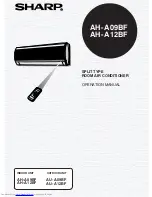
INDOOR TEMP. OUTDOOR TEMP.
COOLING
upper limit
32˚C D.B.
43˚C D.B.
23˚C W.B.
-
lower limit
21˚C D.B.
21˚C D.B.
15˚C W.B.
-
ADDITIONAL NOTES ON OPERATION
OPERATING TEMPERATURE RANGE
• The built-in protective device may prevent the unit from operating when used out of this
range.
• Condensation may form on the air outlet if the unit operates continuously in the COOL or
DRY mode when humidity is over 80 percent.
D.B. = Dry-bulb W.B. = Wet-bulb
TIPS ON SAVING ENERGY
Below are some simple ways to save energy when you use your air conditioner.
WHEN POWER FAILURE OCCURS
This air conditioner has a memory function to store settings when a power failure occurs.
After power recovery, the unit will automatically re-start in the same settings which were
active before the power failure, except for timer settings.
If the timers were set before a power failure, they will need to be re-set after power recovery.
3
SET THE CORRECT TEMPERATURE
• Setting the thermostat 1°C higher than the desired temperature in the COOL mode will
save approximately 10 percent in power consumption.
• Setting the temperature lower than necessary during cooling operation will result in
increased power consumption.
BLOCK DIRECT SUNLIGHT AND PREVENT DRAFTS
• Blocking direct sunlight during cooling operation will reduce power consumption.
• Close the windows and doors during cooling opeation.
SET PROPER AIR FLOW DIRECTION TO OBTAIN THE BEST AIR
CIRCULATION
KEEP FILTER CLEAN TO ENSURE THE MOST EFFICIENT OPERATION
MAKE MOST OF THE TIMER OFF FUNCTION
DISCONNECT THE POWER CORD WHEN THE UNIT IS NOT USED FOR AN
EXTENDED PERIOD OF TIME
• The indoor unit still consumes a small amount of power when it is not operating.






































